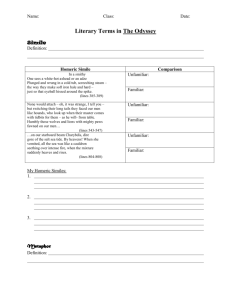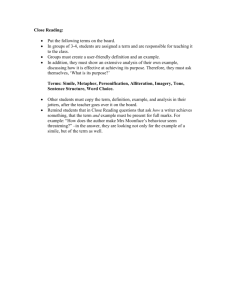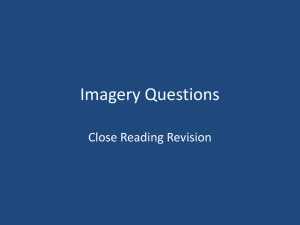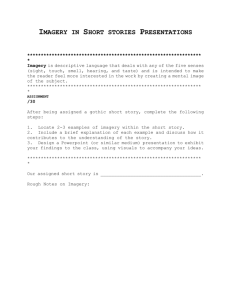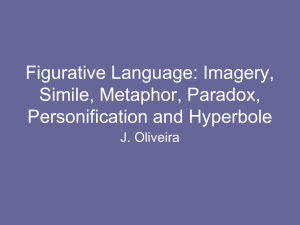Simile - Dearborn High School
advertisement
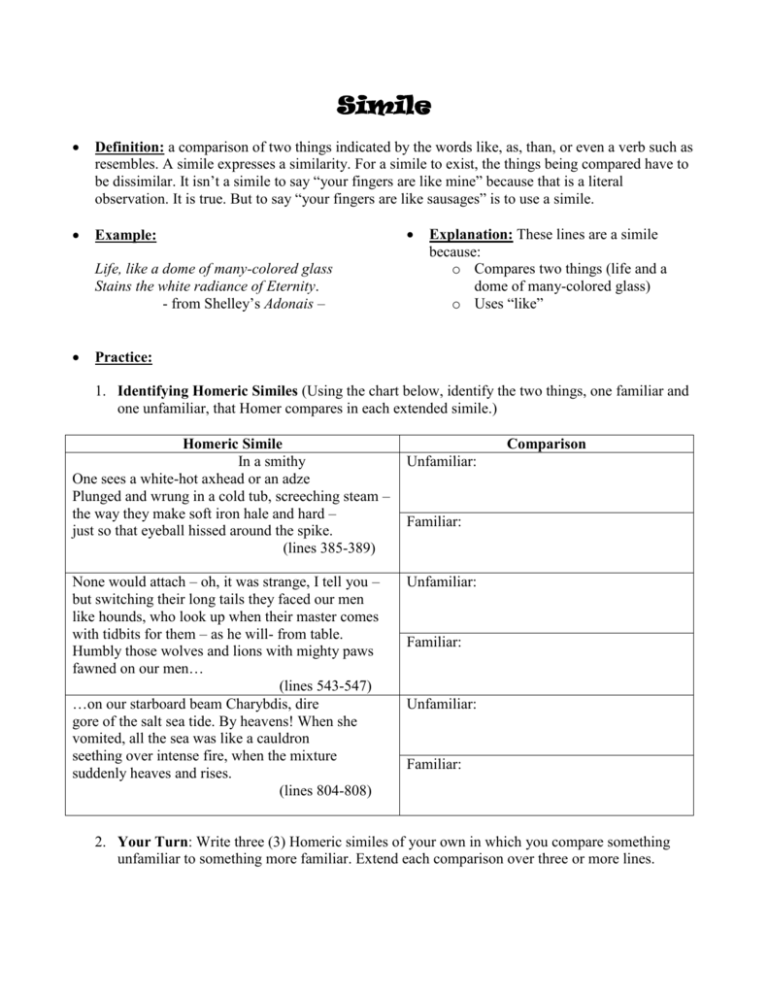
Simile Definition: a comparison of two things indicated by the words like, as, than, or even a verb such as resembles. A simile expresses a similarity. For a simile to exist, the things being compared have to be dissimilar. It isn’t a simile to say “your fingers are like mine” because that is a literal observation. It is true. But to say “your fingers are like sausages” is to use a simile. Example: Life, like a dome of many-colored glass Stains the white radiance of Eternity. - from Shelley’s Adonais – Explanation: These lines are a simile because: o Compares two things (life and a dome of many-colored glass) o Uses “like” Practice: 1. Identifying Homeric Similes (Using the chart below, identify the two things, one familiar and one unfamiliar, that Homer compares in each extended simile.) Homeric Simile In a smithy One sees a white-hot axhead or an adze Plunged and wrung in a cold tub, screeching steam – the way they make soft iron hale and hard – just so that eyeball hissed around the spike. (lines 385-389) None would attach – oh, it was strange, I tell you – but switching their long tails they faced our men like hounds, who look up when their master comes with tidbits for them – as he will- from table. Humbly those wolves and lions with mighty paws fawned on our men… (lines 543-547) …on our starboard beam Charybdis, dire gore of the salt sea tide. By heavens! When she vomited, all the sea was like a cauldron seething over intense fire, when the mixture suddenly heaves and rises. (lines 804-808) Comparison Unfamiliar: Familiar: Unfamiliar: Familiar: Unfamiliar: Familiar: 2. Your Turn: Write three (3) Homeric similes of your own in which you compare something unfamiliar to something more familiar. Extend each comparison over three or more lines. Metaphor Definition: a statement that one thing is something else, which, in a literal sense, it is not. It is a direct comparison without like, as, or than. It will often use some form of the verb to be. Example: My love is a red, red rose. Explanation: This statement is a metaphor because: o Is my love literally a rose? No. But… o It is comparing “my love” to a “red, red rose” Practice: 1. Identifying Metaphors in The Odyssey (Using the chart below, identify the two things that Homer compares in each metaphor.) Metaphor Comparison 1 But he seemed rather a shaggy mountain 2 1 That made the rage of the monster boil over 2 1 His mind churning with thoughts of bloody work 2 2. Your Turn: Write and illustrate your own metaphor. (Be careful it doesn’t turn into a simile!) Imagery Definition: using the sensory perceptions to help a reader experience the passage of literature. Included are: visual imagery, auditory (sound) imagery, tactile (touch) imagery, thermal (hot and cold) imagery, olfactory (smell) imagery, gustatory (taste) imagery, and kinesthetic (movement) imagery. Example: The warm, crimson blood flowed slowly down his charred face. The metallic scent of blood reached across the room to where she was crying softly.. Explanation: This example uses many types of imagery: o “warm…blood” = thermal o “crimson” and “charred” = visual o “crying softly” = auditory o “metallic scent of blood” = olfactory o “flowed slowly” = kinesthetic Practice: 1. Identifying Imagery in The Odyssey (Break down the following quote into as many types of imagery as possible. Record it in the following chart.) “blood ran out around the red-hot bar. Eyelid and lash were seared; the pierced ball hissed broiling, and the roots popped.” (line 338) Type of Imagery Example Visual Auditory Tactile Thermal Olfactory Gustatory Kinesthetic 2. Your Turn: Write a paragraph (3-5 sentences) using as many types of imagery as possible. Make sure that your paragraph is cohesive and makes sense! Allusion Definition: a reference in a literary work to a person, place, or thing in history or in another work of literature. Allusion are often indirect or brief references to well-known characters or events. Example: My mother always warned me, “Never trust a Greek bearing gifts.” Explanation: This statement is an allusion because: o It is referencing the story in the Iliad where the Trojans are tricked into accepting the “Trojan Horse” from the Greeks. o This was not actually a gift, but a treacherous way for the Greeks to enter Troy. Practice: 1. Identifying Allusions (Can you identify the classical story/myth each of these rap lyrics is alluding to?) Rap Lyrics I’m full strength like a Cyclops‘s eye drops, I got support like high-tops. - Ugly Duckling, Left Behind. “The side lines is lined with casualties Who sip the life casually, then gradually become worse Don’t bite the apple, Eve” -Jay-Z “My rep grows like the nose of Pinocchio, Just because I’ve mastered the art of braggadocio.” -Akrobatik “Tonedeff’s slays giants, as if my legal name’s David.” -Tonedeff Allusion 2. Your Turn: Write or draw your own statement alluding to one of the Greek Gods you learned about in your webquest. (Ex. “I’m throwing down lightning, just call me King of Olympus” = Zeus) Epithet Definition: a term or phrase used to describe a character, object, or event in a way that emphasizes its typical characteristic. Generally, an epithet provides us information abou the person or thing to which it is attached. . An epithet that has become cliché because of its excessive use in The Odyssey is “rosy-fingered Dawn.” Example: Explanation: This epithet reveals: o Achilles is known for being fast. Swift-footed Achilles Practice: 1. Breaking down Epithets in The Odyssey (Record what each epithet reveals about the person, object, or event it is attached to.) Epithet Rosy-fingered Dawn Reveals The clear-eyed goddess (Athena) Circe, the nymph with lovely braids Son of Laertes (Odysseus) Who marshals the thunderheads (Zeus) 2. Your Turn: Compose three different epithets for yourself that reveal something about your nature, talents, relationships, etc. Be creative but accurate! Personification Definition: when we give a thing, animal, or abstract idea (ex. truth) human characteristics. Example: Death be not proud, though some have called thee mighty and dreadful. Explanation: This is personification because: o Can death really be proud? Practice: 1. Interpreting personification in The Odyssey (For each example of personification, hypothesize why Homer might have chosen to describe the thing/animal/idea in that manner.) Example of Personification When Dawn spread out her fingertips of rose Hypothesis Sleep looses Odysseus’ limbs, slipping the toils and anguish from his mind. East and South Winds clashed, and the raging West and North sprung from the heavens. Death sat there huge 2. Your Turn: Describe at least five (5) objects in this classroom using personification.
